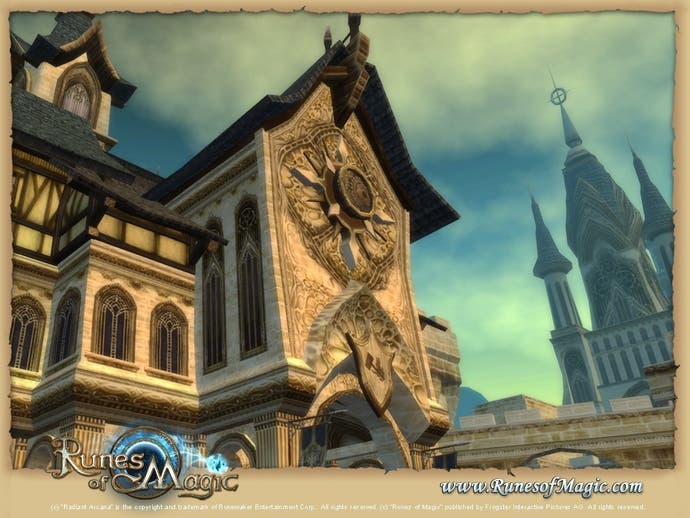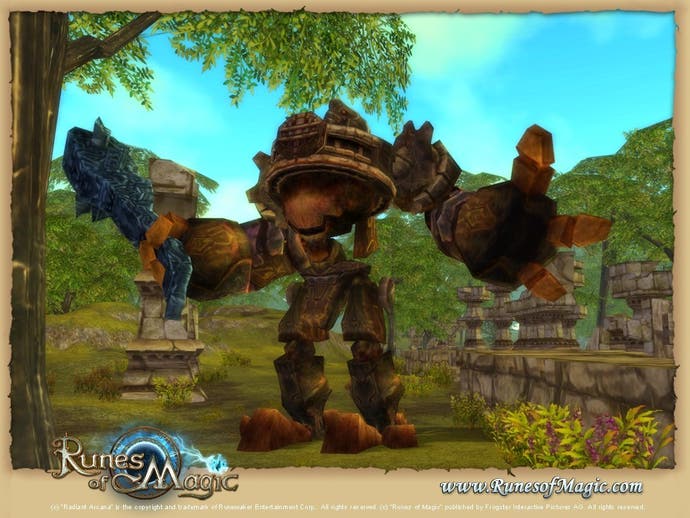Runes of Magic
Even better than the real thing?
Currently, you can swap between your primary and secondary classes by visiting either a class administrator or kinky French maid, sorry, "house fairy" (who very kindly, distractingly, hangs out in the private housing every player has). While in your primary class, you can use your secondary class's "general" abilities, but not their class-specific abilities. So, a knight-mage can throw a few of the latter class's fireballs and lightning bolts, then in mage-knight form, it can utilise some of the latter's Paladin-like seals, while also taking advantage of the knight's heavier armour. However, it's with the question of armour, and weapons, that the peculiarities of the system as it stands emerge.
When you first switch to your secondary class, you suddenly find a lot of your gear is useless, temporarily at least. And not only that, your primary and secondary classes level separately, so you'll have to backtrack to grind some more. Fortunately, Runes of Magic is packed with quests (more than 600 at launch, and loads of dailies), so there's no shortage of means to garner that XP.
It's just, well, a bit odd to keep backtracking to level up your alternate class. Never mind having to keep sorting your inventory, and storing your other class' gear in your bank or the storage chests in your house (which you can furnish). It's unlike Oblivion, where you can, say, train up your nominally leather-wearing class to handle heavy armour; here you're stuck with certain fundamental attributes.
The dual class system is intriguing, and has a lot of promise, but initially it feels lacking in integration, like some sort of dual-personality disorder. It's not so much about hybridisation as about two distinct classes in one character. Here's hoping some or all of these concerns will be addressed in the revision to it before the end of the year.

The game world you can explore with your schizo avatar is impressive, especially for a free-to-play game. Runes of Magic boasts an involved background mythology, with the legacy of former epochs in the titular runes, stones that allow the stats of one piece of gear to be transferred to another, allowing you to keep the look of your armour while changing its attributes - or vice versa.
To date, Taborea has five large regions to explore, with suitably involved eco-systems of aimless mobs, raw materials for crafting (you can do all six skills, then choose one mastery), towns (with auctioneers, traders and crafting facilities), strongholds and dungeons. You can even hire a mount from the start to shorten those journey times, or simply teleport between nodes. The dungeons are another promising area of the game, with the prospect of both static and "tile-based" examples where the instance is randomly reconfigured between visits. Again, for a free game, the sheer variety on offer in Runes of Magic promises is impressive. There's even player-versus-player, in the form of duelling, arenas, open-world PVP and, eventually, server-versus-sever combat.

Axel Schmidt of Frogster believes "that the free-2-play model will be the future in its different forms, particularly for the MMO genre". He's said before that "we really have the ambition to bridge or even surmount the gap between subscription-based and free titles." On the strength of Runes of Magic, that's an increasingly credible prospect. Like many nominally free games, Runes of Magic will at some stage introduce paid-for elements, with Schmidt saying they plan an item shop, but he also says that "we will take care that this system won't harm the balance in the game. All players who don't buy items should be able to enjoy the game alike without constraints."
Even at this early stage, Runes of Magic is a notable new MMO on its own merit, but as a freebie, it's remarkable. It may not be WOW, but this could be the first free MMO to lure considerable numbers of gamers away from their subscriptions.
